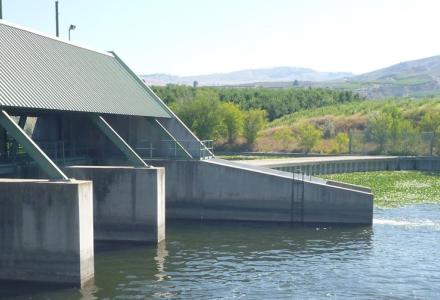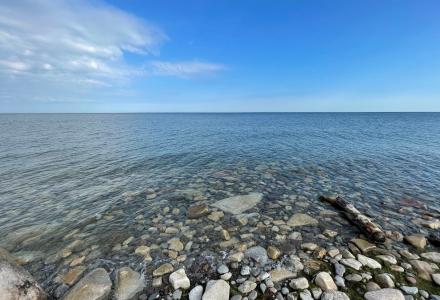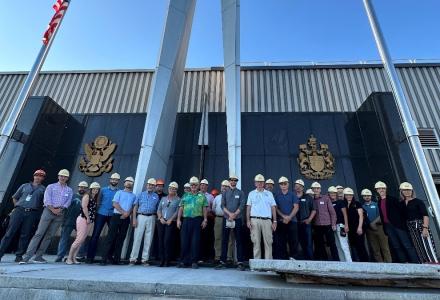
Commissioners and staff of the International Joint Commission mourn the loss and celebrate the spirit of the leadership, integrity, and enduring contributions of Rt. Hon. Herb Gray. Following a career in the House of Commons spanning four decades, the Rt. Hon. Herb Gray served the IJC as co-chair from January 2002-2010. Chairman Gray left a lasting legacy at the IJC and our shared waters are better off because of his service.
He helped steer the Commission through many files including public consultations on the Order on the St. Mary and Milk Rivers, the Spills report on the St. Clair River and Connection Channels, the Advice to the governments on a new Great Lakes Water Quality Agreement, and hearings on Lake Ontario Order. His legacy at the Commission culminated with 2009 celebrations of the Boundary Waters Treaty Centennial.
 Herb Gray has died at age 82. Credit: IJC files.
Herb Gray has died at age 82. Credit: IJC files.
Gordon Walker, Acting Canadian Chair of the IJC, first met Mr. Gray in the 1980s when he was Ontario’s Industry and Trade Minister, and Gray was the Federal Minister of Industry, Trade and Commerce. He noted that “Herb Gray was a diligent public servant with a long and distinguished career. He had a thorough understanding of issues and keen ability to get at the essence of a problem. Those who served with him demonstrated the same commitment to excellence. The International Joint Commission was fortunate to have enjoyed his service for so many years.”
At the IJC, no one was closer to Rt. Hon. Herb Gray than Nick Heisler, IJC Senior Advisor, Strategic Planning and Stakeholder Relations. Nick began working for the Rt. Hon. Herb Gray in March 1998 in the Deputy Prime Minister’s office and joined IJC Chairman Gray as he took the helm at the IJC in 2002.
By Nick Heisler
When the Rt. Hon. Herb Gray, departed from the Canadian Cabinet in January of 2002, he likely could have had any appointment he wanted with the Government of Canada. After almost 42 years in the House of Commons as the MP for Windsor West, 13 Cabinet Posts, including 5 years as the Deputy Prime Minister he had earned it. To the surprise of many, he asked to be the Canadian Chair of the IJC. Some may have thought it was because there was an office in Windsor, which I am sure was a consideration, but I don’t believe it was paramount.
When he was first appointed to the Commission, he told me the story of how as a newly elected MP he was named to the External Affairs Committee of the House of Commons, and one of the first meetings he attended was to consider the Columbia River Treaty. The witness was General Andrew G.L. McNaughton (March 1, 1950 to April 15, 1962), who was then Chair of the IJC. Recounting the story, Mr. Gray said “imagine, I would hear about his exploits on the radio - this man who led the Canadian Forces in the second World War, and I, just a kid out of my short pants, had to question him about that Treaty. I recall he was not very happy with it.”
Mr. Gray chose to come to the IJC because he had a tremendous respect for the Institution, the Boundary Waters Treaty, and the future health of our shared environment. He could have likely served on any corporate board he wanted to, but wanted to continue to really work, and to continue a life of public service.
He would continually marvel, when reading the Boundary Waters Treaty or some previous IJC report, at the wisdom and insight that went into the Commission decisions. One of his favourites was “Protection of the Waters of the Great Lakes” of which he was told former Chair Len Legault (March 10 1997 – March 2001) held the pen on the first draft.
And yes Herb Gray did read old IJC reports with and for pleasure – because that is how thorough he was. As a former colleague is fond of saying – “Herb Gray would ask the tough questions, but he never expected you to know the answers right away – but he expected you find them out – right away.”
On his retirement, I gave him this toast, and I don’t repeat it to flatter myself, but because I do think it still expresses my thoughts best, and it’s often said we only say want we want to of the deceased when it’s too late. I am gratified that I was lucky enough to say it to him when he was still alive:
I’d like to thank Mr. Gray for the wonderful opportunity he has given me over the last 12 years. I have seen things and done things I would never have imagined. And more importantly, I have learnt from him lessons and skills that will serve me a lifetime, and not just the nuts and bolts of how government really works, but life lessons. I have learnt when someone’s absence at meeting is questioned to simply say that I assume they are taking care of our interests elsewhere, to give everyone the benefit of the doubt, and to listen carefully and to be swayed by the weight of the argument, not the weight of the presenter. If you can’t say something nice, don’t say anything at all. (And even if you memorized your speech to have a hard copy handy). It is these qualities that have led our chair to be so respected. So I would like to recount a story about that respect.
One day in Deputy Prime Minister’s Office I was having a really bad day - I was in a cat fight with the Prime Minister's office and getting nowhere. And I commiserated with a colleague who said "forget them. At the end of the day, you’re amongst a handful of people who had the opportunity to work with the greatest parliamentarian, best political strategist and most honourable politician this country has ever seen. At the end of your days you can say you worked for Herb Gray - and they can't. What greater honour is there than that."
I have to say in the close to 12 years I have worked for Mr. Gray I have heard similar comments from many people – from those who worked in the mailroom to those who were Deputy Ministers proudly telling me "I too worked for Herb Gray." So I say to you, my IJC colleagues, join me in a toast, because you too are among the few who can honestly say "I worked for Herb Gray," and understand that nothing more really needs to be said.”
Thank you Mr. Gray. Salute!
By Murray Clamen, Former Secretary of the Canadian Section
When I learned that Herb Gray was going to be the next Chairman of the Canadian Section of the IJC in January 2002, I wasn't quite sure how to react. An icon in Canadian politics for almost 40 years, I was nervous that as Secretary of the Canadian Section, I would not be able to respond to what I assumed would be a tough and very demanding person. On the other hand, at the age of 70, I thought he might want to slow down and take on his new role in a bit more relaxed style. Well I was wrong on both accounts.
Mr. Gray proved to be a very respectful and extremely hard working Commissioner. We worked closely together for 8 years and while some could call him Herb I never felt comfortable doing so - and he always addressed and introduced me as Dr. Clamen. From the start I remember him telling me, and the staff, that he was used to long hours and that we could call him at home anytime we needed to up until 11 pm.
Almost every afternoon, I recall him taking home two large briefcases full of documents that he wanted to go over that night. He was a voracious reader of newspapers, magazine articles, publications of all kinds and, of course, Hansard. He read every Memorandum sent to him, always very carefully, and went over draft documents and IJC reports with the eye of an eagle for mistakes and inconsistencies, which he often found, buried in the middle of the document - proof of his careful proofreading abilities. Every morning, I and the staff would be treated to a buffet of paper with endless comments and questions scribbled across the page which sometimes took longer to decipher than to determine the answer itself!
He was a student of the IJC and the Boundary Waters Treaty and wanted to learn as much as he could quickly, although he knew quite a bit already having represented Windsor for all those years and being part of the Great Lakes watershed. One thing that surprised me, but which shouldn't have really given the many letters he wrote to the IJC as an MP and Minister, was his strong interest and concern for water and the environment. He wanted to show strong support for the IJC's Great Lakes Regional office immediately by visiting it and supporting its work.
Most often our time together was dedicated to IJC matters but, on occasion, when travelling or relaxing a bit in the office or on the road, we would talk about politics and other things in common. We shared a common heritage and alma mater and that was always something we could discuss. I wanted to know about his political career and remember asking him how he was able to deflect all those questions in the House of Commons. He looked at me with those bushy eyebrows and a slight smirk and replied "well it is called Question Period not Answer Period!" and that said it all. He could recall events in his career and Canadian history in amazing detail so I asked how he was able to do that. He replied simply "that was my life".
On the occasion of his retirement at a farewell get together in the IJC office in Ottawa, I hoped he would write a book of his life and career and asked if the IJC would be a footnote, a page or a chapter in his life. Unfortunately I never found out as that book was not written and a tremendous man has left us with numerous memories and stories untold.




